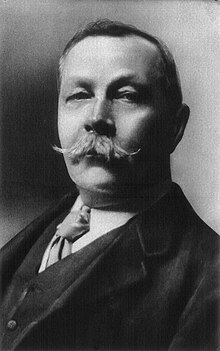About the Book: "The Adventure of the Gloria Scott", one of the 56 Sherlock Holmes short stories written by British author Sir Arthur Conan Doyle, is one of 12 stories in the cycle collected as The Memoirs of Sherlock Holmes. It is chronologically the earliest case in Sherlock Holmes canon. This story is related mainly by Holmes rather than Watson, and is the first case to which Holmes applied his powers of deduction, having treated it as a mere hobby until this time.
About the Author: Arthur Ignatius Conan Doyle was born on 22 May 1859 at 11 Picardy Place, Edinburgh, Scotland. From 1876 to 1881, he studied medicine at the University of Edinburgh, including a period working in the town of Aston (now a district of Birmingham) and in Sheffield, as well as in Shropshire at Ruyton-XI-Towns. While studying, Doyle began writing short stories. His earliest extant fiction, "The Haunted Grange of Goresthorpe", was unsuccessfully submitted to Blackwood's Magazine. His first published piece "The Mystery of Sasassa Valley", a story set in South Africa, was printed in Chambers's Edinburgh Journal on 6 September 1879. On 20 September 1879, he published his first non-fiction article, "Gelsemium as a Poison" in the British Medical Journal. In 1882 he joined former classmate George Turnavine Budd as his partner at a medical practice in Plymouth, but their relationship proved difficult, and Doyle soon left to set up an independent practice. Arriving in Portsmouth in June of that year with less than £10 (£900 today) to his name, he set up a medical practice at 1 Bush Villas in Elm Grove, Southsea. The practice was initially not very successful. While waiting for patients, Doyle again began writing stories and composed his first novels, The Mystery of Cloomber, not published until 1888, and the unfinished Narrative of John Smith, which would go unpublished until 2011. He amassed a portfolio of short stories including "The Captain of the Pole-Star" and "J. Habakuk Jephson's Statement", both inspired by Doyle's time at sea, the latter of which popularized the mystery of the Mary Celeste and added fictional details such as the perfect condition of the ship (which had actually taken on water by the time it was discovered) and its boats remaining on board (the one boat was in fact missing) that have come to dominate popular accounts of the incident. Doyle struggled to find a publisher for his work. His first significant piece, A Study in Scarlet, was taken by Ward Lock Co. on 20 November 1886, giving Doyle £25 for all rights to the story. The piece appeared later that year in the Beeton's Christmas Annual and received good reviews in The Scotsman and the Glasgow Herald. The story featured the first appearance of Watson and Sherlock Holmes, partially modeled after his former university teacher Joseph Bell. Doyle wrote to him, "It is most certainly to you that I owe Sherlock Holmes ... Round the center of deduction and inference and observation which I have heard you inculcate I have tried to build up a man." Robert Louis Stevenson was able, even in faraway Samoa, to recognize the strong similarity between Joseph Bell and Sherlock Holmes: "My compliments on your very ingenious and very interesting adventures of Sherlock Holmes. ... Can this be my old friend Joe Bell?" Other authors sometimes suggest additional influences—for instance, the famous Edgar Allan Poe character C. Auguste Dupin. A sequel to A Study in Scarlet was commissioned and The Sign of the Four appeared in Lippincott's Magazine in February 1890, under agreement with the Ward Lock company. Doyle felt grievously exploited by Ward Lock as an author new to the publishing world and he left them. Short stories featuring Sherlock Holmes were published in the Strand Magazine. Doyle first began to write for the 'Strand' from his home at 2 Upper Wimpole Street, now marked by a memorial plaque. In this period, however, Holmes was not his sole subject and in 1893, he collaborated with J.M. Barrie on the libretto of Jane Annie. Doyle was found clutching his chest in the hall of Windlesham Manor, his house in Crowborough, East Sussex, on 7 July 1930. He died of a heart attack at the age of 71. His last words were directed toward his wife: "You are wonderful." At the time of his death, there was some controversy concerning his burial place, as he was avowedly not a Christian, considering himself a Spiritualist. He was first buried on 11 July 1930 in Windlesham rose garden. He was later reinterred together with his wife in Minstead churchyard in the New Forest, Hampshire. Carved wooden tablets to his memory and to the memory of his wife are held privately and are inaccessible to the public. That inscription reads, "Blade straight / Steel true / Arthur Conan Doyle / Born May 22nd 1859 / Passed On 7th July 1930." The epitaph on his gravestone in the churchyard reads, in part: "Steel true/Blade straight/Arthur Conan Doyle/Knight/Patriot, Physician, and man of letters". Undershaw, the home near Hindhead, Haslemere, south of London, that Doyle had built and lived in between October 1897 and September 1907, was a hotel and restaurant from 1924 until 2004. It was then bought by a developer and stood empty while conservationists and Doyle fans fought to preserve it. In 2012 the High Court ruled that the redevelopment permission be quashed because proper procedure had not been followed. A statue honours Doyle at Crowborough Cross in Crowborough, where he lived for 23 years. There is also a statue of Sherlock Holmes in Picardy Place, Edinburgh, close to the house where Doyle was born.
My Review: Another nice plot and Holmes again nail it. Holmes, in his university days, spent a month with his friend, Victor Trevor, at his father's estate in Norfolk. While there, Holmes amazed his host, Victor's father, who was a Justice of the Peace and a landowner besides. He had made his fortune in the goldfields in Australia. One of Holmes's deductions was that the elder Mr. Trevor was once connected with someone with the initials J. A. whom he wanted to forget. His host then passed out on the table. Holmes had touched a sore spot, and possibly did not believe the old man's explanation once he had come back to himself that J. A. had been an old lover.
Holmes perceived that he was making his host uncomfortable and decided to take his leave. The evening before he did this, another old man suddenly appeared at the house causing the elder Mr. Trevor to rush for a shot of brandy before greeting him. They had apparently been shipmates some 30 years earlier, and Mr. Trevor said something about finding him some work. Soon afterwards, Holmes and his friend found Mr. Trevor drunk.
Holmes spent the next seven weeks at his chemistry experiments, suddenly receiving a telegram from the younger Trevor begging him to come back to Norfolk. Once he got there, Victor told Holmes that his father was dying as a result of a stroke suffered after he received a letter. They found that he had died while Victor had been meeting Holmes at the station.
After Holmes had left the house seven weeks earlier, it seems that this old man who had come looking for work, and whose name was Hudson, proved to be as unruly an employee as could be imagined. He had demanded to be promoted from gardener to butler and had got what he wanted. He had taken unforgivable liberties which would normally have resulted in an employee's dismissal. He was often drunk. Victor could not stand him and would have beaten Hudson up if he had been younger. The other staff had complained about him. However, Victor's father always let him get away with any infamy. Suddenly, Hudson announced that he was leaving because he had tired of Norfolk, and he was going to Hampshire to see Beddoes, another old shipmate.
Now, Holmes's friend had become thin and careworn by the ordeal. He had thought that the trouble was over when Hudson had left, but then came the letter, from Fordingbridge in Hampshire. It read:
"The supply of game for London is going steadily up. Head-keeper Hudson, we believe, has been now told to receive all orders for fly-paper and for preservation of your hen pheasant's life."
It meant nothing to Victor, and it was quite a while before Holmes saw anything in it. He found the key. If one read every third word beginning with the first, there was an intelligible message: "The game is up. Hudson has told all. Fly for your life."
Holmes had deduced that the game was blackmail. Some guilty secret had been the power that Hudson had held over the elder Mr. Trevor. The old man's dying words to his doctor unlocked the secret. Some papers were found in Mr. Trevor's Japanese cabinet.
The document was a confession. The elder Mr. Trevor had once borne the name James Armitage (initials: J. A.) and had been a criminal having embezzled money from the bank where he worked and been caught. He was sentenced to Transportation.
Once on the ship, the Gloria Scott, bound for Australia from Falmouth, Armitage found out from a neighbouring prisoner that there was a conspiracy to take over the ship. The neighbour, Jack Prendergast, had financed the scheme out of the nearly £250,000 in unrecovered money from his crime. Many of the crew, even officers, were in his employ, and even the chaplain, who was not truly a clergyman at all. He, while pretending to minister to the prisoners, was actually furnishing them with pistols and other equipment to be used when the time was right. Armitage also drew his other neighbour, Evans, into the scheme.
As might be expected, all did not go as planned. The takeover was accomplished unexpectedly when the ship's doctor discovered a pistol while treating a prisoner. The prisoners then had to make their move right away or they would lose the element of surprise. In the ensuing mêlée, many men were killed, and there arose a dispute between Prendergast with his supporters and a group including Armitage over what to do with the few loyal crewmen still left alive. Armitage and others would not stand for coldblooded murder. They asked to be cast adrift in a small boat to make their way as they would.
Shortly after leaving in their small boat, the Gloria Scott blew up as the result of the violence spreading to where the gunpowder was kept. The men in the small boat, among whom was also Evans, hurried back to the site and rescued one survivor — Hudson.
The next day, as luck would have it, the men were rescued by another ship, the Hotspur, also bound for Australia. They passed themselves off as survivors from a passenger ship and once in Australia, headed for the goldfields. Armitage changed his name to Trevor, and Evans changed his name to Beddoes. Both later returned to England as rich men.
All had gone well until Hudson had suddenly shown up.
Since no scandal involving the Gloria Scott ever followed the odd message from Beddoes (Evans), and since neither Hudson nor Evans was ever heard from again, the Police believed Hudson had done away with Beddoes while Holmes believed that Evans had likely killed Hudson, believing that he had told all, when in fact he had not, and then fled with as much money as he could lay his hands on.



No comments:
Post a Comment